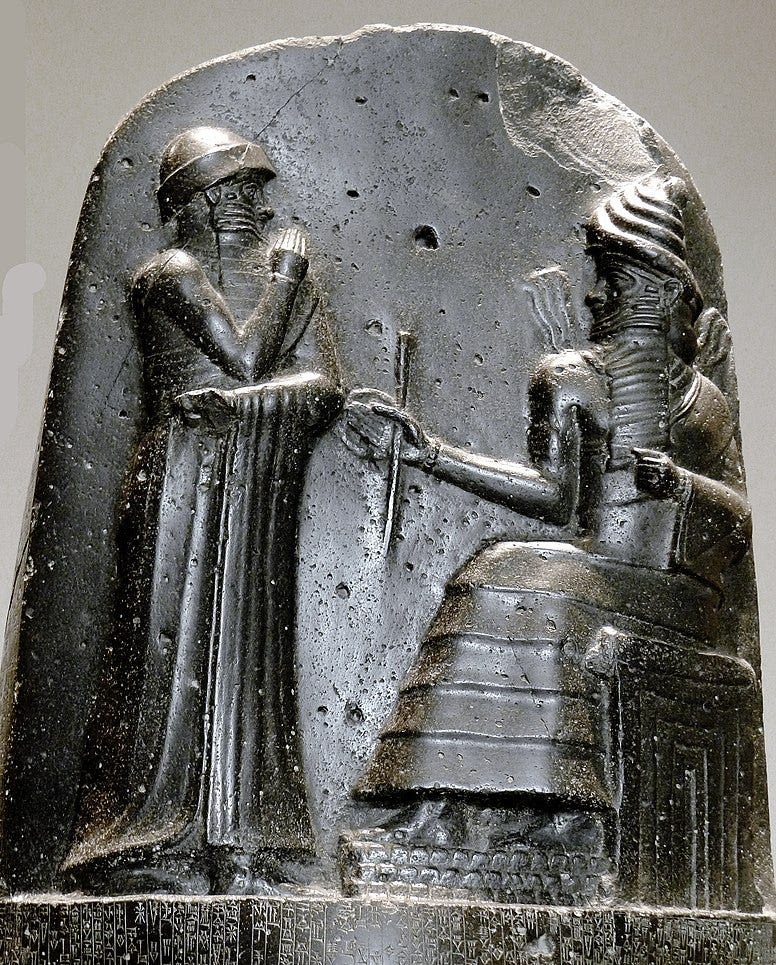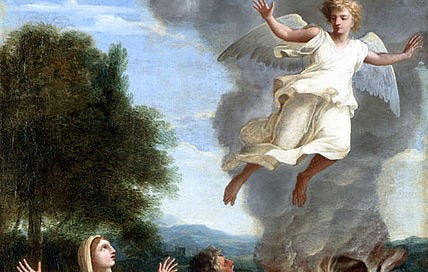Judges Chapter 13 Bible Study
An angel appears... and vanishes. Also, a woman has a baby.
This is part thirteen of my Judges study. Read the previous parts here and watch for part fourteen coming on January 15.
Judges 13-16 tell the story of Samson, the last judge recorded in this book. His account is the longest and he is also the worst of the judges, being more depraved than any of the others we have covered. This chapter tells the tale of Samson’s birth and next month, we will be getting into his adult life.
Once again, the Israelites did some bad stuff. As a punishment, God allowed the Philistines to oppress them for forty years. Unlike previous situations, however, there is no mention of the people crying out to God for help. This shows just how bad the situation in Israel was by this point; the Israelites were so deep in idolatry and sin that they did not even turn to the Lord in desperation as their ancestors had done. Then, the angel of the Lord appeared to an unnamed woman, the wife of Manoah, a Danite, from Zorah. The town of Zorah originally belonged to the tribe of Dan and later became part of Judah’s territory.1 It has been identified with the site of Tel Tzora, a place mentioned in Amarna letter 273 as belonging to the king of Gezer.2
He told her that although she had been unable to conceive, she would give birth to a son who would be a Nazirite from birth and must never have his hair cut. The expression translated here as “you must never cut his hair” is more literally rendered as “a razor is not to go up on his head,” and razors at this time would likely have been made of either copper or bronze.3 The angel also said that this son would “begin to save Israel from the power of the Philistines,” a statement that implies the Philistines would still be a problem for the Israelites long after his death.4
Numbers 6:1-21 details what a Nazirite vow entailed. It was generally a temporary thing in which a person consecrated themself to the Lord for a certain time. These people were not allowed to consume any grapevine product or alcoholic beverage and were forbidden from having their hair cut and touching dead bodies during the period of their vow. Unlike in the stories of other women in the Bible who could not have children for many years such as Sarah, Rachel, Hannah, and Elizabeth, the text here never says that Manoah’s wife wished for a child. However, it is reasonable to assume that she would have greatly wanted to have a baby given that childlessness was seen as quite tragic and unfortunate in ancient Israel.5 Hammurabi’s law code even allows for a man to divorce his wife if she is infertile (CH § 138) as children were highly valued in the ancient Near East.6

After this encounter, the woman told her husband what she had witnessed. Manoah then prayed, asking God to send the angel again to teach them what they should do about their son. His request reflects a belief that the testimony of a woman could not be considered valid, something that the angel did not agree with given his appearance to Manoah’s wife instead of Manoah himself.7 It may also remind readers of Gideon’s requests concerning his fleece as he has already been told what God wanted to communicate to him.8
So, the angel of the Lord appeared a second time to Manoah’s wife who ran to fetch her husband. Somewhat ironically, the Hebrew name Manoah means “rest,” and this was not exactly a restful time in Israel’s history.9 When Manoah arrived, he verified the man’s identity and then asked about the boy's responsibilities and work. The man replied, saying that his wife must not eat anything unclean or drink wine or beer.
Not knowing that he was speaking to the angel of the Lord, Manoah told the man to stay so he could prepare a young goat as a meal. The messenger declined the offer of food though he said that Manoah was free to sacrifice the goat as a burnt offering to the Lord. Manoah asked the angel of the Lord for his name but he told him that his name was beyond comprehension. This refusal of the angel to give his name reflects the namelessness of Manoah’s wife in the passage, as she recognizes who he is while her husband does not.10 Then Manoah offered the young goat and a grain offering to the Lord but the flame from the altar went up into the sky, the angel of the Lord inside the flame.
Manoah and his wife fell onto their faces, realizing who they had been conversing with. Frightened, Manoah exclaimed that they would surely die as they had seen God. His wife told him that the Lord would have refused their offering if he was going to kill them. Later on, their son was born, and they named him Samson.
The name Samson is composed of the Hebrew word for sun and uses the diminutive ending, essentially meaning something like “little sun.”11 It likely has an etymological connection to the name of the Mesopotamian sun god Shemesh/Shamash.12 This is further evidenced by the fact that a nearby town was called Beth Shemesh, meaning “Temple of Shemesh,” showing that worship of this god was practiced in the area.13
The birth narrative of Samson has many parallels to those of other influencial biblical figures, including Jesus. It sets him up as someone God will use for his purposes during the period of the judges. However, as we will later learn, Samson is most definitely not a character to emulate and there are some indications of this even before he is born. According to Way’s commentary,
A closer reading of chapter 13 also reveals subtle hints that the opening scene for Samson is far from perfect. First, “forty years” constitutes the longest period of oppression in the entire book, which may be proportional to the amount of apostacy in Israel (13:1). Second, the double mention of barrenness (13:2-3) may be interpreted as a curse for breaking covenant (Deut. 7:13-14; 28:18). Third, the triple mention of dietary prohibitions implies that the Israelites are ignorant of apathetic about the torah (Judg. 13:4, 7, 14). Fourth, Manoah’s wife fails to report to Manoah the most important news of all—that this child will begin to deliver Israel from the Philistines (13:5; cf. 13:7). Fifth, Manoah displays distrust toward his wife, the angel, and God (13:8, 17, 22). Sixth, Manoah tries to assume control of the situation by taking his wife’s place and asking for the angel’s name (13:11, 12, 17). And finally, Manoah’s wife chooses the unorthodox name Samson (13:24), which may have pagan connotations.14
Such concludes the story of the angel’s visit to Samson’s parents. Next month, we will look at Samson’s first marriage and what went wrong there.
BIBLIOGRAPHY
Block, Daniel I. “Judges.” In Joshua, Judges & Ruth, edited by John H. Walton, 198-451. Zondervan Illustrated Bible Backgrounds Commentary Series. Grand Rapids, MI: Zondervan, 2009.
Boda, Mark J. “Judges.” In Judges, Ruth, edited by Tremper Longman III and David E. Garland, 30-347. The Expositor’s Bible Commentary Series. Grand Rapids, MI: Zondervan, 2012.
Evans, Mary J. Judges and Ruth. Tyndale Old Testament Commentaries Series. Downers Grove, IL: InterVarsity Press, 2017.
McCann, J. Clinton. Judges. Interpretation: A Bible Commentary for Preaching and Teaching Series. Louisville, KY: John Knox Press, 2011.
Way, Kenneth C. Judges and Ruth. Teach the Text Commentary Series. Grand Rapids, MI: Baker Books, 2016.
Webb, Barry G. The Book of Judges. The New International Commentary on the Old Testament Series. Grand Rapids, MI: William B. Eerdmans Publishing Company, 2012.
Younger Jr., K. Lawson. Judges and Ruth. The NIV Application Commentary Series. Grand Rapids, MI: Zondervan, 2002.
Webb, The Book of Judges, 355.
Block, “Judges,” 337.
Block, “Judges,” 340.
Boda, “Judges,” 247.
Evans, Judges and Ruth, 136.
Block, “Judges,” 338.
Evans, Judges and Ruth, 137.
Younger, Judges and Ruth, 279.
Way, Judges and Ruth, 172-173.
McCann, Judges, 105.
Block, “Judges,” 342.
Block, “Judges,” 343.
Way, Judges and Ruth, 173.
Way, Judges and Ruth, 174.






It is interesting that angels often appear to women. I wonder if women are more open to that encounter. Samson is an interesting character. I am intrigued by the Nazirite vow - the consecration aspect of it. Thanks for sharing!
Well written Rachel. I also liked that you included commentary from Ways. I found it interesting and informative. I did not ever think about the meaning of Samson or the rampant idolatry. I am wondering if Samson's parents taught himself a young child about the significance of a Nazrite vow....I look forward to your next post.